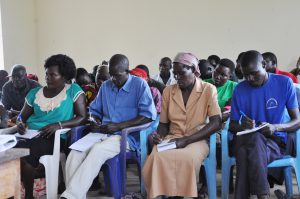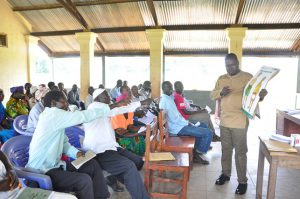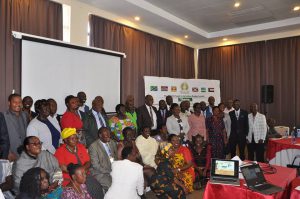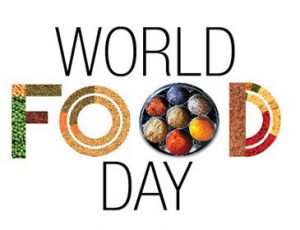Knowledge is power. But sometimes, this power needs a little propeller to start running, Skill!
 For the past two year FRA together with her member organisation War on Want NI with financial support from Rosa Luxemburg Foundation have been organising platforms for farmer communities and their lower local governments to meet and dialogue over the issues affecting their livelihood.
For the past two year FRA together with her member organisation War on Want NI with financial support from Rosa Luxemburg Foundation have been organising platforms for farmer communities and their lower local governments to meet and dialogue over the issues affecting their livelihood.
The unprecedented platforms that have been held in the two districts of Amuria and Ngora, have continuously provided levelled space for community members to share, discuss and reflect on critical aspects of their lives particularly how to address the barriers standing between them and the social and economic status they each desire to realise. These dialogues have allowed these individuals to appreciate their responsibilities and the role they need to play to realise this transformation.
In addition, the dialogues have provided an avenue for the duty bearers to provide guidance and support on how the community members can realise this transformation. Technical officials at the sub-county level in the fields of crop, fisheries and animal husbandry have steered discussions on how the community members can improve their agricultural productivity to realise food, nutrition and income security. The sub-county chiefs (SAS) and the community development officers have on the other hand diligently provided procedural guidance on how to address the various social challenges ranging from land conflicts to domestic violence.
Following the two years of reflection, FRA and her partners realised a need to go an extra mile and build the capacity of these communities to address the challenges they are facing. It was against this background that on 19th and 22nd June, following the introduction of a new project phase in the project districts aimed at accelerating the momentum of building a vibrant exodus towards tapping women’s full potential in agriculture, food security and rural transformation; the partners together with the Ngora DLG organised capacity building trainings of these community members on how to enhance their household nutrition security.
Through these trainings, community members enhanced their knowledge on the nutrition benefits of the various foods particularly those indigenous to the Teso-sub region, the most nutritionally beneficial means of preparation and consumption. They were guided on the food categories required in a balanced diet and the roles of different foods in their bodies; the causes of mal nutrition; how to identify a mal nourished child and the transgenerational cycle of maternal mal nutrition.
 FRA through these trainings has taken a lead in the implementation of Food and Nutrition Security at household level with a strong view of strengthening community involvement, participation, revitalization of Growth Monitoring and Promotion and integration of various nutrition interventions in order to accelerate the achievement of the development goals of ending hunger and child.
FRA through these trainings has taken a lead in the implementation of Food and Nutrition Security at household level with a strong view of strengthening community involvement, participation, revitalization of Growth Monitoring and Promotion and integration of various nutrition interventions in order to accelerate the achievement of the development goals of ending hunger and child.
Matilda Nakawungu


 In 2003, African heads of state met in Maputo the capital of Mozambique where they made a joint commitment to harness the potential of the agriculture sector to foster development in their countries. These commitments are popularly known as the Comprehensive Africa Agriculture Development Program (CAADP) commitments. They were seven key commitments that were to be achieved within a period of 10 years. In a nutshell, the African Heads of State and Governments committed to foster a 6% annual agricultural GDP growth in their countries and the major avenue through which this was to be realised was through an allocation of at least 10% of their national budgets to the agricultural sector.
In 2003, African heads of state met in Maputo the capital of Mozambique where they made a joint commitment to harness the potential of the agriculture sector to foster development in their countries. These commitments are popularly known as the Comprehensive Africa Agriculture Development Program (CAADP) commitments. They were seven key commitments that were to be achieved within a period of 10 years. In a nutshell, the African Heads of State and Governments committed to foster a 6% annual agricultural GDP growth in their countries and the major avenue through which this was to be realised was through an allocation of at least 10% of their national budgets to the agricultural sector. According to the review, all the East African Community member states except for Tanzania were found to be on track in the realisation of these commitments with a score above 3.94 – the set benchmark. It was the findings of this report and the strategic national budgeting timing that inspired the holding of the 3rd EAC People’s Agriculture Budget Summit on 30th -31st May 2018 in the Kenyan capital of Nairobi. Convened by farmers’ organisations, civil society organisations and other NSAs in close partnership with the EALA committee on Agriculture Tourism Natural Resources (ATNR), the summit was held under the theme “Promoting an Inclusive, People Centered EAC Budget Process: Incentives for Prudent Public and Private Investment in Agriculture”.
According to the review, all the East African Community member states except for Tanzania were found to be on track in the realisation of these commitments with a score above 3.94 – the set benchmark. It was the findings of this report and the strategic national budgeting timing that inspired the holding of the 3rd EAC People’s Agriculture Budget Summit on 30th -31st May 2018 in the Kenyan capital of Nairobi. Convened by farmers’ organisations, civil society organisations and other NSAs in close partnership with the EALA committee on Agriculture Tourism Natural Resources (ATNR), the summit was held under the theme “Promoting an Inclusive, People Centered EAC Budget Process: Incentives for Prudent Public and Private Investment in Agriculture”.  The summit noted that contrary to the CAADP goal, the sector contribution to the regional GDP was consistently declining in performance and actual value and; EAC Partner States’ budgetary allocation to the agriculture sector and farmers had for over 5 years not exceeded 7 percent even with government’s commitment to the Malabo Declaration.
The summit noted that contrary to the CAADP goal, the sector contribution to the regional GDP was consistently declining in performance and actual value and; EAC Partner States’ budgetary allocation to the agriculture sector and farmers had for over 5 years not exceeded 7 percent even with government’s commitment to the Malabo Declaration. With the joining of forces between the people of East Africa and the EALA, there finally seems to be a light at the end of this proverbial tunnel. A new matra is born to this generation – a people centred agriculture budget shall revolutionise the backbone of our economy. You have got to agree, now is the time we put all the promises and commitments off the papers and into action. Because the reality is, agriculture is the indispensable key to sustained food security, economic growth and social transformation for the East African region.
With the joining of forces between the people of East Africa and the EALA, there finally seems to be a light at the end of this proverbial tunnel. A new matra is born to this generation – a people centred agriculture budget shall revolutionise the backbone of our economy. You have got to agree, now is the time we put all the promises and commitments off the papers and into action. Because the reality is, agriculture is the indispensable key to sustained food security, economic growth and social transformation for the East African region.

